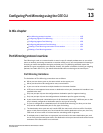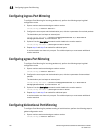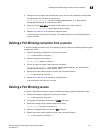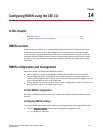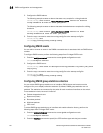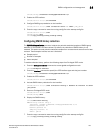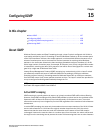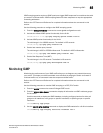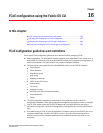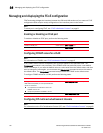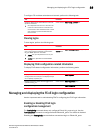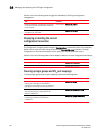
Dell Converged Enhanced Ethernet Administrator’s Guide 127
53-1002116-01
Chapter
15
Configuring IGMP
In this chapter
•About IGMP . . . . . . . . . . . . . . . . . . . . . . . . . . . . . . . . . . . . . . . . . . . . . . . . . . 127
•Configuring IGMP. . . . . . . . . . . . . . . . . . . . . . . . . . . . . . . . . . . . . . . . . . . . . . 128
•Configuring IGMP snooping querier . . . . . . . . . . . . . . . . . . . . . . . . . . . . . . . 128
•Monitoring IGMP . . . . . . . . . . . . . . . . . . . . . . . . . . . . . . . . . . . . . . . . . . . . . . 129
About IGMP
Multicast Control packet and Data Forwarding through a Layer-2 switch configured with VLANs is
most easily achieved by Layer-2 forwarding of received Multicast Packets on all the member ports
of the VLAN interfaces. However, this simple approach is not bandwidth efficient, because only a
subset of member ports may be connected to devices interested in receiving those Multicast
packets. In the worst case scenario the data would get forwarded to all port members of a VLAN
with a large number of member ports (for example, all 24 ports), even if only a single VLAN member
is interested in receiving the data. Such scenarios can lead to loss of throughput for a switch that
gets hit by a high rate of Multicast Data Traffic.
Internet Group Management Protocol (IGMP) snooping is a mechanism by which a Layer-2 switch
can effectively address this issue of inefficient Multicast Forwarding to VLAN port members.
Snooping involves “learning” forwarding states for Multicast Data traffic on VLAN port members
from the IGMP control (Join/Leave) packets received on them. The Layer-2 switch also provides for
a way to configure forwarding states statically through the CLI.
NOTE
Dell Fabric OS supports IGMPv1 and IGMPv2.
Active IGMP snooping
IGMP snooping is normally passive by nature, as it simply monitors IGMP traffic without filtering.
However, active IGMP snooping actively filters IGMP packets to reduce load on the multicast router.
Upstream traffic is filtered so that only the minimal quantity of information is sent. The switch
ensures the router only has a single entry for the VLAN, regardless of the number of active listeners
downstream.
In active IGMP snooping, the router only knows about the most recent member of the VLAN. If there
are two active listeners in a VLAN and the original member drops from the VLAN, the switch
determines that the router does not need this information as the status of the VLAN remains
unchanged. However the next time there is a routine query from the router, the switch will forward
the reply from the remaining host to prevent the router from assuming there are no active listeners.



